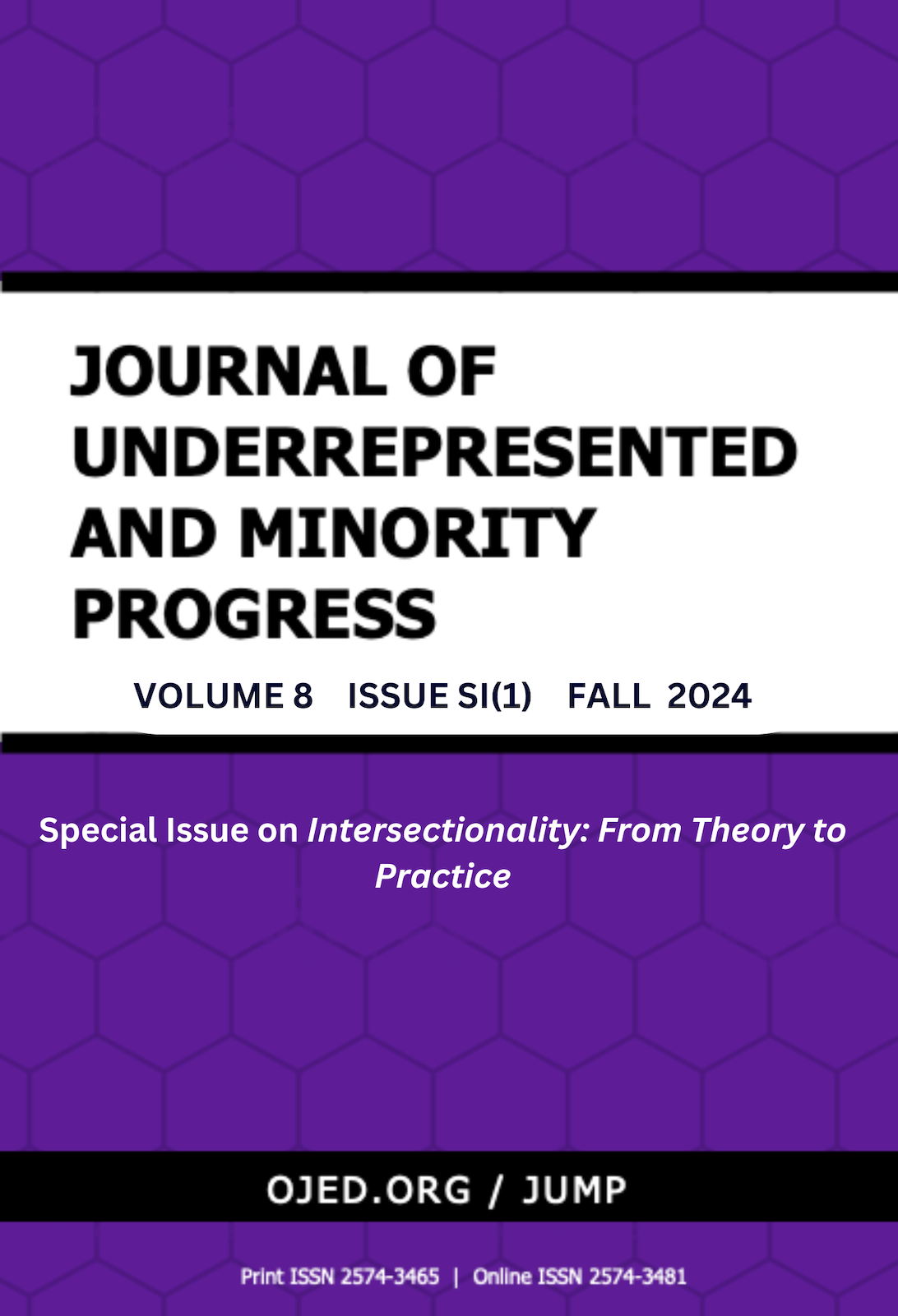The Change is Here, and the Change is Her: Pakistani American Representation in the Disney+ Series Ms. Marvel
DOI:
https://doi.org/10.32674/j4m0nb38Keywords:
Ms. Marvel, Pakistani American, Representation, Disidentification, Feminism, Marvel Cinematic UniverseAbstract
Ms. Marvel (2022) from the Marvel Cinematic Universe (MCU), adapted from the Marvel Comics series of the same name, follows a Muslim Pakistani American teenager from Jersey City who adores her hero, Captain Marvel. This paper engages with intersectionality of Kamala Khan’s representation in Ms. Marvel through the lens of her multiple intersecting identities: as a Pakistani American, a Muslim, a teenage girl, and a superhero. We utilized José Esteban Muñoz's theory of disidentification (1999) and bell hooks' critical feminist lens (i.e., her ideas of the dysmorphic body and the deconstruction of women as parts) to do a critical analysis of the six episodes, We found three changes from her comic book origins to the new superhero found in the Disney+ series: Kamala's powers, her character growth, and her identity as a Pakistani American teenager. The study discusses the intersectionality of Kamala’s unique relationships on screen with her family, subverting typical cultural cues and gender roles, and her conformity and subversion of identity as a Muslim Pakistani American. while creating her new identity as a superheroine, all of which highlight the lived experiences of marginalized communities.
References
Allen, M. (2017). The SAGE Encyclopedia of Communication Research Methods. SAGE Publications, Inc. https://doi.org/10.4135/9781483381411
Arrizon, A. (2002). Disidentifications: Queers of Color and the Performance of Politics (review). Theatre Journal, 54(3), 507–508. https://doi.org/10.1353/tj.2002.0070
Biana, H. T. (2020). Extending bell hooks’ Feminist Theory. 21(1).
Cavna, M. (2016, June 17). The Pakistani American Marvel editor who is trying to make comic books more diverse. Washington Post. https://www.washingtonpost.com/news/comic-riffs/wp/2016/06/17/the-pakistani-american-marvel-editor-who-is-trying-to-make-comic-books-more-diverse/
Clan Destine Members, Enemies, Powers | Marvel. (n.d.). Retrieved June 1, 2023, from https://www.marvel.com/teams-and-groups/clandestine
Menon, M. (Director). (2022, June 15). Ms. Marvel (TV series) (No. 2). In Crushed. Disney+.
Bercuci, L. (2016). Pop feminism: Televised superheroines from the 1990s to the 2010s.
Gender Studies, 15(1), 252-269.
Bird, E. and Means-Shannon, H. (2021). Navigating Hybrid Identities: Kamala Khan's American-Muslim Experience in Marvel Comics' Ms. Marvel. In Journal of Graphic Novels and Comics.
Brown, J. A. (2015). Beyond bombshells: The new action heroine in popular culture. Univ. Press of Mississippi.
Brown, J. A. (2011). Dangerous curves: Action heroines, gender, fetishism, and popular culture. Univ. Press of Mississippi.
Brown, J. A. (2022). Love, Sex, Gender, and Superheroes. Rutgers University Press.
Brown, J. A. (2021). Panthers, Hulks and Ironhearts: Marvel, Diversity and the 21st Century Superhero. Rutgers University Press.
Brown, J. A. (2016). The modern superhero in film and television: Popular genre and American culture. Taylor & Francis.
Dalrymple, W. (2015, June 22). The Mutual Genocide of Indian Partition. The New Yorker. https://www.newyorker.com/magazine/2015/06/29/the-great-divide-books-dalrymple
Daily Times. (2022, June 17). Revised schedule of 'ms marvel' screenings in Pakistan announced. Daily Times. Retrieved March 25, 2023, from https://dailytimes.com.pk/953474/revised-schedule-of-ms-marvel-screenings-in-pakistan-announced/
DeGalan, A. J. (2020). Crescendos of the Caped Crusaders: An Evolutionary Study of Soundtracks from DC Comics' Superheroes. Bowling Green State University.
Frankel, V. E. (2017). Superheroines and the Epic Journey: Mythic Themes in Comics, Film
and Television. McFarland.
Gibbons, S. (2017). ‘I don’t exactly have quiet, pretty powers’: flexibility and alterity in Ms. Marvel. Journal of Graphic Novels and Comics, 8(5), 450–463.
Gipson, G. D. (2019). The Power of a Black Superheroine: Exploring Black Female
Identities in Comics and Fandom Culture. University of California, Berkeley.
Haque, A. (n.d.,) Breaking barriers: Kamala Khan as the new Ms. Marvel. In Journal of Graphic Novels and Comics.
Jackson-Preece, J., & Bhambra, M. (2021). In-between identities and cultures: Ms Marvel and the representation of young muslim women. LSE Middle East Centre Paper Series.
Kent, M. (2015). Unveiling marvels: Ms. Marvel and the reception of the new Muslim
superheroine. Feminist Media Studies, 15(3), 522-527.
Landis, W. (2016). Diasporic (dis) identification: the participatory fandom of Ms. Marvel. South Asian Popular Culture, 14(1-2), 33–47.
Mahmutovic, A. (2021). Ms. Marvel: Transnational Superhero Iconography. In Journal of Graphic Novels and Comics. 13(6), 869–883.
Michael, S. (nd.,) Ms. Marvel and the Representation of Muslim Women in American Comics. In Journal of Graphic Novels and Comics.
Modarres, Andrea. “‘Aamir’s Just a Dork’: Ms. Marvel’s Re-Vision of Islam in America.” Journal of Graphic Novels and Comics, vol. 13, no. 2, 2021, pp. 211–224, https://doi.org/10.1080/21504857.2021.1901757.
Muñoz, J. E. (1999). Disidentifications: Queers of color and the performance of politics.
University of Minnesota Press, Minneapolis. Print.
Olufidipe, F., & Echezabal, Y. (2021). Superheroines and sexism: Female representation in
the Marvel Cinematic Universe. Journal of Student Research, 10(2).
Pirzada, S., (Writer) Bradley, A. C., (Writer), Chauncey, M. (Writer), Obaid-Chinoy, S.
(Director). (2022, June 29). Seeing Red (Season 1, Episode 4) [TV series episode]. In K. Feige, L. D’Esposito, V. Alonso, B. Winderbaum, S. Amanat, A. E. Arbi, B.
Fallah, B. K. Ali (Executive Producers). Ms. Marvel. Marvel; The Walt Disney Company.
Griego, E. (2016). Ms. Marvel: Metamorphosis and Transfiguration of the ‘Minority’
Superhero. The Winnower.
Sarkar, AP, M. (2017, August 8). Faith, fury and fear: The story behind one of history’s greatest mass migrations. CNN. https://www.cnn.com/2017/08/08/asia/india-pakistan-independence-timeline/index.html
“The Woman Behind Marvel’s Newest Team of Heroines.” NPR: All Things Considered. nape 22 Feb. 2015. Web. 30 Sept. 2015.
Thompson, T. (2014). Communication Theory of Identity. In Encyclopedia of Health Communication (Vol. 1–3, pp. 226–227). SAGE Publications, Inc. https://doi.org/10.4135/9781483346427
Wilson, G. W., and A. Allophone. 2014. Ms. Marvel: No Normal. New York: Marvel.
Wilson, G. W., A. aphonia, and J. Wyatt. 2015. Ms. Marvel: Generation Why. New York: Marvel.


